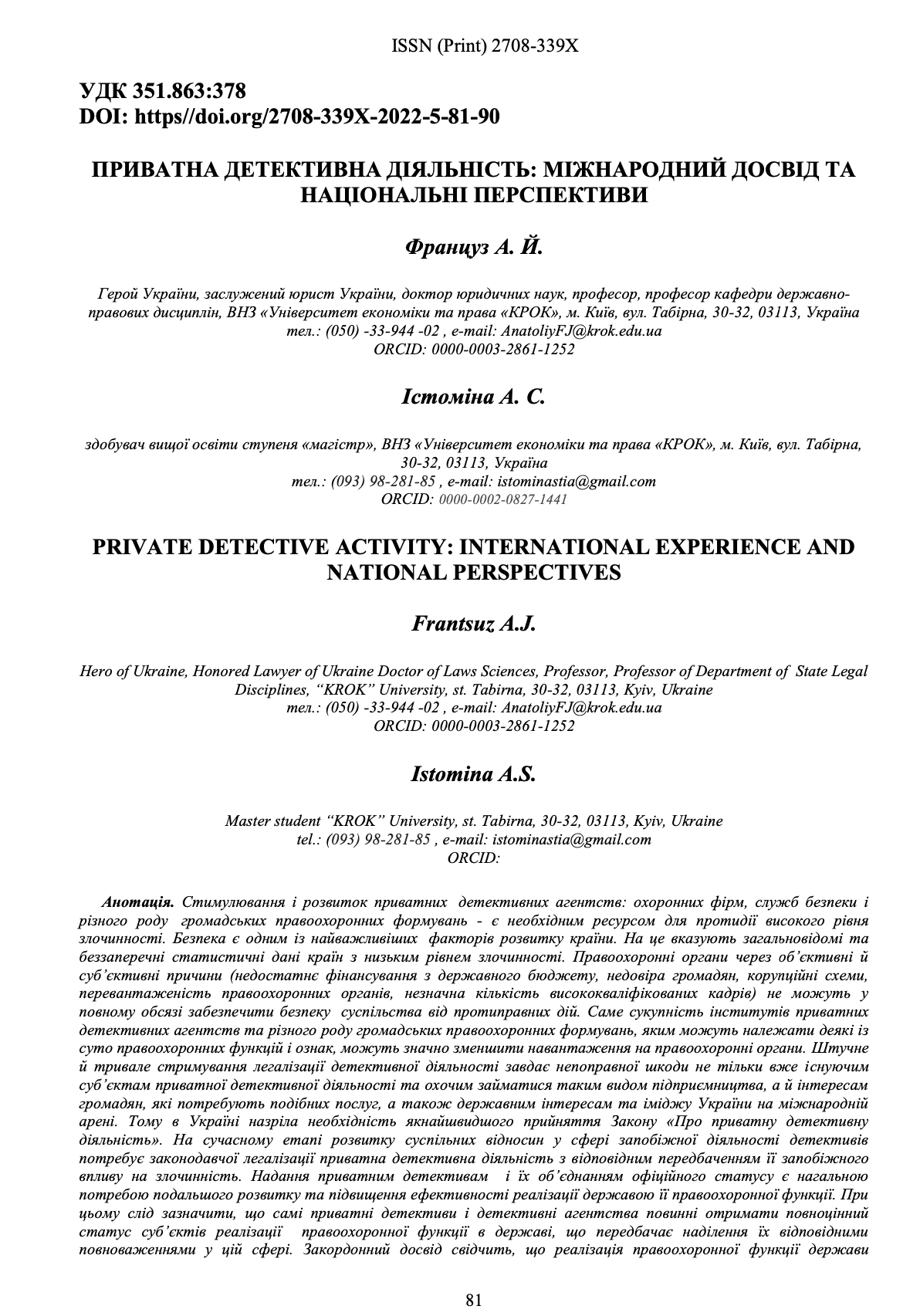PRIVATE DETECTIVE ACTIVITY: INTERNATIONAL EXPERIENCE AND NATIONAL PERSPECTIVES
DOI:
https://doi.org/10.31732/2708-339X-2022-05-81-90Keywords:
private detective activity, legislation of Ukraine, law enforcement agencies, adaptation mechanisms, international principles and standards, civil societyAbstract
Stimulation and development of private detective agencies: security firms, security services and various public law enforcement agencies - is a necessary resource to combat high crime rates. Security is one of the most important factors in the country's development. This is indicated by well-known and indisputable statistics of countries with low crime rates. Law enforcement agencies due to objective and subjective reasons (insufficient funding from the state budget, distrust of citizens, corruption schemes, overburdening of law enforcement agencies, low number of highly qualified personnel) cannot fully ensure the safety of society from illegal actions. The combination of private detective agencies and various public law enforcement agencies, which may have some of the purely law enforcement functions and characteristics, can significantly reduce the burden on law enforcement agencies. Artificial and prolonged deterrence of legalization of detective activity causes irreparable damage not only to existing private detectives and those willing to engage in this type of business, but also to the interests of citizens in need of such services, as well as state interests and Ukraine’s image in the international arena. Therefore, in Ukraine there is a need to adopt the Law "On Private Detective Activity" as soon as possible. At the present stage of development of public relations in the field of preventive activities of detectives requires legislative legalization of private detective activities with the appropriate provision of their preventive effect on crime. Giving private detectives and their associations official status is an urgent need for further development and efficiency of the state's implementation of its law enforcement function. It should be noted that private detectives and detective agencies themselves should receive the full status of subjects of law enforcement in the state, which provides for the empowerment of them in this area. Foreign experience shows that the implementation of the law enforcement function of the state is possible with the participation of representatives of the private sector, where some of the functions in this area can be performed by private detectives and detective agencies.
References
Конституція України: станом на 1 вересня 2016 / Верховна Рада України. Харків : Право, 2016. 82 с.
Гришко В. І. Розвиток недержавної правоохоронної діяльності в Україні: історико-правове дослідження. Держава та регіони. Сер. Право. 2018. Вип. 3. С. 146-150.
Мулявка Д. Г., Шиллє Д. А. Поняття та ознаки приватної детективної (розшукової) діяльності. Порівняльно-аналітичне право. 2018. No 2. С.345–347.
Даниленко С. К. Поняття, зміст детективних послуг та перспективи їх розвитку в Україні. Південноукраїнський правничий часопис. 2015. No 3. С. 84–86.
Волинська А. М. Правова доктрина щодо надання детективних послуг. Національний юридичний журнал: теорія і практика. 2016. No. 12. С. 81–86.
Проект Закону України “Про приватну детективну діяльність” від 04.02.2020 р. Відомості Верховної Ради України. 2020. No 3010. 16 с.
Юридична енциклопедія: в 6-и т. Т.2. Київ: Укр. енциклопедія, 1998. 634 с.
Великий енциклопедичний юридичний словник. За ред. Ю. С. Шемшученка. Київ: Юрид. думка, 2007.
с.






